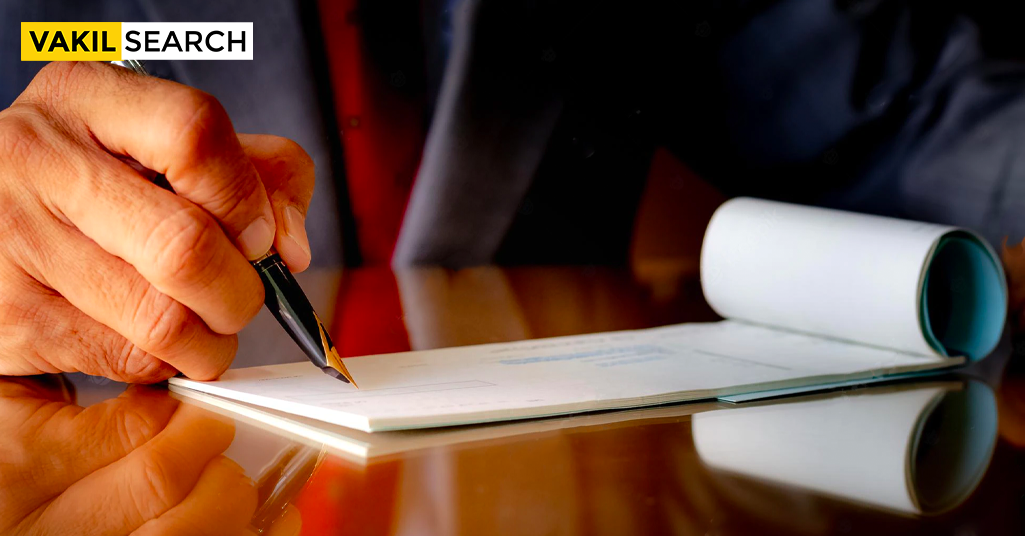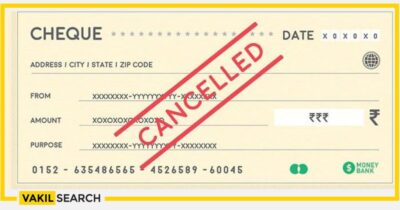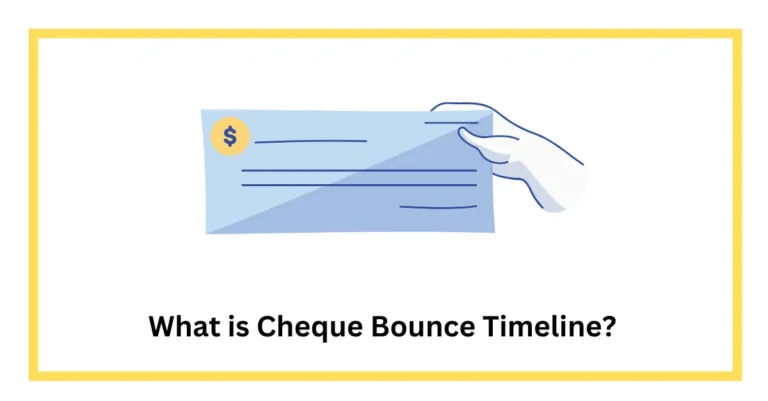A cheque is a negotiable instrument that facilitates the transfer of funds from one account to another. There are a few instances where the cheque becomes dishonoured due to the negligence of the issuer. Under such conditions, the issuer of the check will be penalised.
Legally a cheque is a bill of exchange under the Negotiable Instrument Act 1881, that instructs a bank to pay a specific amount from one person’s account to another person’s account, under whose name the cheque has been issued. When the cheque fails to achieve the said act, due to the lack of sufficient funds in one’s account it is said that the Cheque has bounced. The term cheque bounce refers to the ineffectual processing of a sanctioned cheque for several reasons, the main reason being, the insufficiency of funds in the issuer’s bank account.
Dishonoured Cheque
A cheque is a promise made by the payer to the payee against a certain amount of money. The payee or the drawee deposits the cheque in an authorised bank. Ideally, the amount is transferred from the payer’s account to the payee’s account.
Alternatively, there are instances wherein the payer’s or the payee’s bank declines to honour this commitment. When this scenario surfaces, it is said that the cheque is dishonoured. This can happen for a variety of reasons. This predominantly occurs due to insufficiency of funds. It can also happen due to the mismatch of account numbers or when the cheque gets disfigured or damaged.
A cheque bounce may also occur if the date mentioned on the cheque is not clear. Also, in certain circumstances, the issuer of the cheque might choose to withhold the payment. In this case, also, the cheque is considered a dishonoured cheque.
Repercussions of Dishonouring a Cheque
Act 1881. However, the payee has discretion over this issue and can either opt to allow the payer to reissue the check within 3 months or can choose to prosecute the issuer.
The issuer of the cheque is given an option of reissuing the cheque within 3 months from the date mentioned in the cheque. That aside, the banks also levy penalties for dishonouring the cheque, which vary from bank to bank. The payee can register the complaint for cheque bounce in a magistrate’s court within a month of the expiry of the notice period. By the law of limitation, if the payee fails to take action, the suit will become time-barred and, hence, not be entertained by the court unless sufficient and reasonable cause for the delay is shown.
When a complaint is filed along with the Legal Affidavit and the necessary documents, the court will issue a summons and address the matter. If found guilty, the defaulter can be punished with a term of two years of imprisonment and/or a fine, which can be as high as twice the cheque amount. These legal remedies are available only when there is a clear-cut case of debt or liability. Legal remedies, therefore, can be sought out, only if the cheque was issued to honour a debt or liability.
Therefore, if a cheque was issued as a donation, or say, as a gift to someone, and the cheque bounced due to insufficiency of funds, the payee cannot sue the payer, since, there is no pending debt or liability in this case.
Cost Incurred for the Cheque Bounce Case
A demand notice can be sent by the payee directly or through an advocate. In Delhi, it would cost somewhere between ₹1500 – ₹2000. However, the payee has to be Lawyer’s Representation in Court. Depending upon the experience of the lawyer, the payee will be charged ₹5000 to ₹20,000. Usually, when a payment is stopped due to a cheque bouncing, a demand notice will be sent to the issuer of the cheque.
Note: The cost for the cheque bounce may vary due to multiple reasons. This is just an estimate and purely informational purpose.
The notice, thus sent, threatens to start proceedings against the issuer under the Negotiable Instruments Act, 1881 if the amount due is not credited. A criminal complaint can be lodged if the payer fails to send a new cheque.
Points to be Kept in Mind Before Issuing the Cheque
- An account payee cheque must be issued
- The signature on the cheque and the one registered with the bank must be one and the same
- The issuer must make sure to check if there is a sufficient balance in the account
- The details in the cheque must be spelt carefully without any typographical errors.
The biggest remedy to prevent the bouncing of cheques is to go the digital way. When the funds are transferred online, instead of using a cheque, this issue can be prevented, for good. Also, adequate care has to be employed by the payer while issuing cheques.
Frequently Asked Questions
What is the charge of dishonoured cheque?
The act of dishonoring a cheque is considered a criminal offense, carrying penalties of imprisonment for up to one year, a fine of up to double the amount of the dishonored check, or both.
What are the charges for ₹1 lakh cheque bounce?
The rate depends on the banks. For more details connect with your banker.
Who charges Dishonour fee?
The dishonour fee is typically charged by financial institutions, such as banks or credit unions, when a cheque is returned due to insufficient funds or other reasons. This fee serves as a penalty for the inconvenience caused and helps cover the administrative costs incurred by the institution.
How many times can a cheque be Dishonoured?
There are no limits on how many times a cheque can be presented, and each time it's represented and dishonoured, it creates a new basis for filing a complaint.
How do I avoid a cheque bounce charge?
To prevent incurring cheque return fees, it's crucial to confirm that the account has enough funds. If unsure about the balance, choosing to postdate the cheque allows the issuer sufficient time to ensure adequate funds are available.
What does Dishonour 03 mean?
DISHONOUR-03 means not enough funds available. The payer's account does not contain sufficient funds to process the payment.
What is the new law on cheque bounce in India?
Bouncing a cheque is a criminal offence according to Section 138 of the Negotiable Instruments Act, 1881, in India. The issuer could be subject to imprisonment for up to two years, a fine, or both.
Also, Read:









